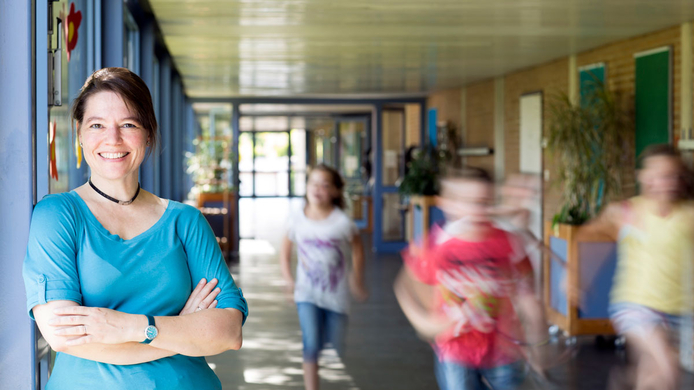Explore our resources for teaching and education degrees and learn about career options that fit your future.

Humans have an unlimited capacity to learn. But for learning to be most effective — at least in the formal education sense — methods of delivering new ideas and concepts need to constantly evolve with the times.
In this article, let's celebrate some milestones in educational innovation and educational technology and then detail how things are changing for today's students. Along the way, we'll share a few quotes and tips from various TED Talk presenters and the National Education Association on the future of education.
Major Technology Trends That Shaped Modern Learning - Timeline
If there is one area of government policy that is constantly tinkered with by both politicians and educators, it's the technology and formats used in teaching. One-room schoolhouses became multi-building campuses. Chalkboards became white boards. Slide rules became calculators. Typewriters became computers. Instead of turning in a hand-written essay, students uploaded digital files to Canvas. That change has exponentially accelerated in the last 30 years with the rapid changes in technology in education.
As technology evolves, so do education techniques. Before we look to tomorrow, let's revisit the timeline of major milestones in educational innovation.
- The Origins of Distance Learning (1800s)
Distance learning isn't a new thing. Illinois Wesleyan University and the University of Wisconsin (UW) were early providers of degree programs for those away from the physical campus. "Distance ed" was the term first used by UW back in 1892.
- Envisioning the eReader (1940s)
Long before iPads and Kindles, Vannevar Bush imagined the Memex in a 1945 article titled As We May Think. This theoretical device would allow users to store and retrieve books, records, and communications. It inspired early hypertext systems and ultimately influenced the development of the World Wide Web. Today, e-readers and cloud-based apps have transformed how we access educational content, dramatically reducing the cost and increasing the availability of digital resources.
- Learning Through Television (1950s)
In 1953, KUHT, a PBS affiliate in Texas, partnered with the University of Houston to broadcast the first college credit courses on television. Other institutions soon followed. The reach was impressive — a series of televised physics lessons were viewed by over 100,000 high school students in 1956-57.
- The PLATO System and Early EdTech (1960s)
PLATO (Programmed Logic for Automated Teaching Operations), was developed at the University of Illinois, was a pioneering educational platform with multiple user roles — students, teachers, and content authors. It introduced data tracking, messaging, and curriculum customization. Meanwhile, developments like Sketchpad and ARPANET laid the technological foundations for online learning platforms and the internet itself.
- Going Global (1980s)
Building on PLATO's foundation, The Learning Manager (TLM) was launched, broadening institutional roles. In 1984, the Intercultural Learning Network connected schools across Japan, Israel, Mexico, and the U.S., creating one of the first online international learning communities. Around this time, British engineer Tim Berners-Lee proposed the World Wide Web, which would transform communication and education on a global scale.
- Collaboration and Online Platforms (1990s)
As the internet matured, so did collaborative learning tools. In 1991, Johndan Johnson-Eilola conceptualized the Smart Board, an intelligent touchscreen whiteboard. Microsoft entered the space in 1995 with the Microsoft Online Institute, offering dynamic, self-paced learning content. These innovations emphasized flexibility, interactivity, and remote accessibility.
- The Blackboard Era (2000s)
Blackboard emerged as a leading cloud-based learning platform in the early 2000s. It allowed students to access course materials anytime, anywhere. As it grew, Blackboard merged with other edtech companies and became widely adopted by institutions. Its influence cemented the importance of learning management systems (LMS) in higher education.
- Rise of Self-Paced Learning (2010s)
The last decade saw the rise of MOOCs (Massive Open Online Courses) and competency-based education. These models allowed students to move at their own pace, mastering one section or module, showing "competency," and then moving on to the next. Data-driven, adaptive technologies personalized the learning experience, and the traditional teacher-centered model began to give way to more student-focused, flexible instruction.
- Fully Online Learning (2020s)
When the 2020 pandemic hit, it's an understatement to say we weren't prepared. As society shut down, everything from shopping to watching movies and television series moved online because stores, theaters, and all other public venues were closed to prevent the spread of the virus. The same was true with education, as schools were shuttered. As a necessity, online education took off so students could still learn, but from home rather than from the classroom. As Zoom improved the online meeting space, it created the online classroom in real time. Even when the virus waned, many students, particularly those who were not the typical 19-22-year-old college student, said they preferred keeping with fully online learning rather than having to travel to a campus in person.
Debating What's Next for Education
As technology has dramatically changed how we live and learn, there have been calls for dramatic change in education. This really began to take hold about a decade ago.
This is what author and educator Ken Robinson said in his Bring On the Learning Revolution! TED Talk: "It's not about scaling a new solution; it's about creating a movement in education in which people develop their own solutions, but with external support based on a personalized curriculum."
To highlight the need to move away from a standardized, mass-production education approach, he said, "We have to change from the industrial model to an agricultural model, where each school can be flourishing tomorrow."
Liz Coleman, then president of Bennington College, critiqued higher education in a TED Talk in 2014, saying, "Universities should teach students how to deal with a world in constant motion, a world that doesn't come labeled and arranged for you, a world in which you have to work with a lot of other people both because you need their help and because they need to understand why you think what you're doing makes sense. We've lost sight of this, but we can reclaim it through education."
Salman Khan — who has single-handedly changed education through his Khan Academy, which offers a carefully structured series of educational videos (predominantly in math) on YouTube — promotes a type of blended learning and assessment-based teaching in his "Let's Use Video to Reinvent Education" TED Talk.
Khan says, "By removing the one-size-fits-all lecture from the classroom and letting students have a self-paced lecture at home, and then when you go to the classroom, letting them do work, having the teacher walk around, having the peers actually be able to interact with each other, these teachers have used technology to humanize the classroom."
A New Educational Challenge – Teaching Generation Z and Alpha
When discussing the younger generations, there is some confusion as to what constitutes a Millennial, a member of Generation Z, and a member of Generation Alpha. The trusted research organization, the Pew Research Center, established the ground rules to use in its research.
Pew decided to use 1996 as the last birth year for Millennials. So, anyone born between 1981 and 1996 is classified as a Millennial, and anyone born between 1997 and 2012 is part of Generation Z. The latest generation to be created is Generation Alpha, consisting of those born between 2012 and today.
There are some characteristics that make Generations Z and Alpha stand out. From an educational perspective, there are three primary traits of students born over the last nearly 30 years that significantly impact their learning experience:
- True Digital Nativity: Unlike previous generations, Generation Z and Alpha have never known a world without pervasive technology. They are deeply integrated with digital tools and expect constant connectivity and immediate access to information and feedback.
- Exceptional Diversity: Generations Z and Alpha are the most diverse generations to date, with nearly half identifying as racial or ethnic minorities. They value diversity and are more likely to advocate against inequality.
- High Rates of Depression and Anxiety: A significant and growing number of Gen Z/Alpha students are experiencing high rates of mental health problems including depression and anxiety. This is thought to be influenced by academic pressure, perfectionism, social media, and insufficient sleep.
Strategies for Engaging Today's Students
To acknowledge and work with the above traits of this generation, educators need to adjust their teaching styles.
- Use educational software — Gen Z/Alpha students likely have never had a cursive writing course. Many have never seen a typewriter. To help reach them, utilize technology tools in your teaching. These tools can create interactive presentations, educational games, and more.
- Incorporate visuals — These generations don't respond to long lectures or big blocks of copy. To keep them engaged, incorporate charts, graphics, and multimedia where possible.
- Vary your methods — With this group, you'll want to try different teaching methods to see where you have success. Be open to shaking things up.
- Understand other cultures — We all have biases based on our own culture and upbringing. Take an honest look at your background and try to identify any biases you may hold. And then explore the cultures of your students; understanding their diversity is key to reaching them as students.
- Use diverse books and materials — Be sure to incorporate multicultural literature and materials into your curriculum. Your diverse students will identify with protagonists who look like them. This will help them better engage with your teaching.
- Expect anxiety — Gen Z/Alpha students are experiencing higher levels of anxiety and depression, so you need to be cognizant of that in your teaching. There are different tools for mental health to experiment with. For instance, an authoritative style could be counterintuitive with this group. Try engaging on a one-on-one basis where possible. Focus on positive contributions and recognize student success. Work to build confidence. And don't overlook the available assistance of school mental-health personnel, such as school psychologists and school counselors, when working with student anxiety and depression.
Adapting Your Teaching for Today's Learners
We are now a quarter way through the 21st century, and there is a growing understanding that teaching must change to keep up with the times. The National Education Association has been leading the way in this arena for the past decade, as the organization believes the old ways in the classroom don't adequately prepare today's students.
In its publication, Preparing 21st Century Students for a Global Society, the NEA emphasizes what it calls the four Cs: critical thinking and problem solving, communication, collaboration, and creativity and innovation.
"America's system of education was built for an economy and a society that no longer exists. In the manufacturing and agrarian economies that existed 50 years ago, it was enough to master the 'Three Rs' (reading, writing, and arithmetic). In the modern 'flat world,' the 'Three Rs' simply aren't enough. If today's students want to compete in the global society, they must be proficient communicators, creators, critical thinkers, and collaborators (the 'Four Cs')."
The Four Cs: Essential 21st Century Skills
To thrive in today's global society, students must master the "Four Cs" defined by the NEA:
- Critical Thinking: Solve problems, make decisions, and adapt in an ever-changing world.
- Communication: Share ideas clearly across media, cultures, and teams.
- Collaboration: Work effectively in diverse groups and contribute to shared goals.
- Creativity: Innovate, explore, and embrace mistakes to fuel growth.
These skills prepare students for success in education, the workforce, and beyond.
The NEA has a series of approaches for integrating the Four Cs into your teaching. And you can burnish your online teaching skills with this four-course certificate.
Keeping the Focus on a Moving Target
As education continues to evolve to keep up with the rapid changes in society, the best teachers of today and tomorrow will employ the latest tools, strategies, and methods, understanding that the education methods of the past aren't cutting it today. From competency-based education to understanding Generation Z and Alpha to fitting the Four Cs into your daily lesson plans, the future of education is now.
If you're looking to earn your master's degree in education or teaching, to earn your teaching credential or add an authorization, or to upgrade your skills with a certificate, UMass Global's School of Education is a great place to start. Together, we can move the needle forward in education.
Learn more about online learning at UMass Global. Wanting to learn more about your learning style and if online education is right for you, take our quiz, "What Type of Online Learner Are You?"








